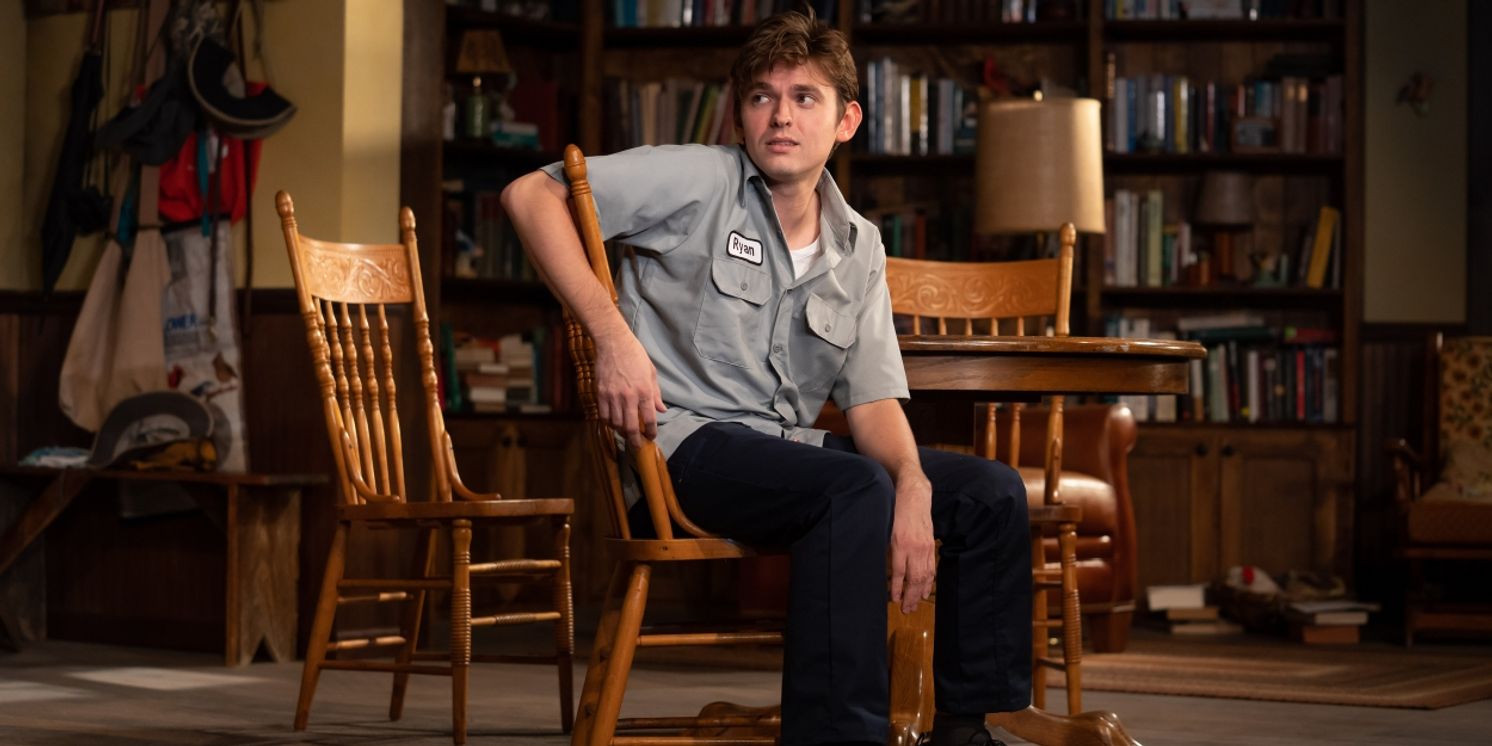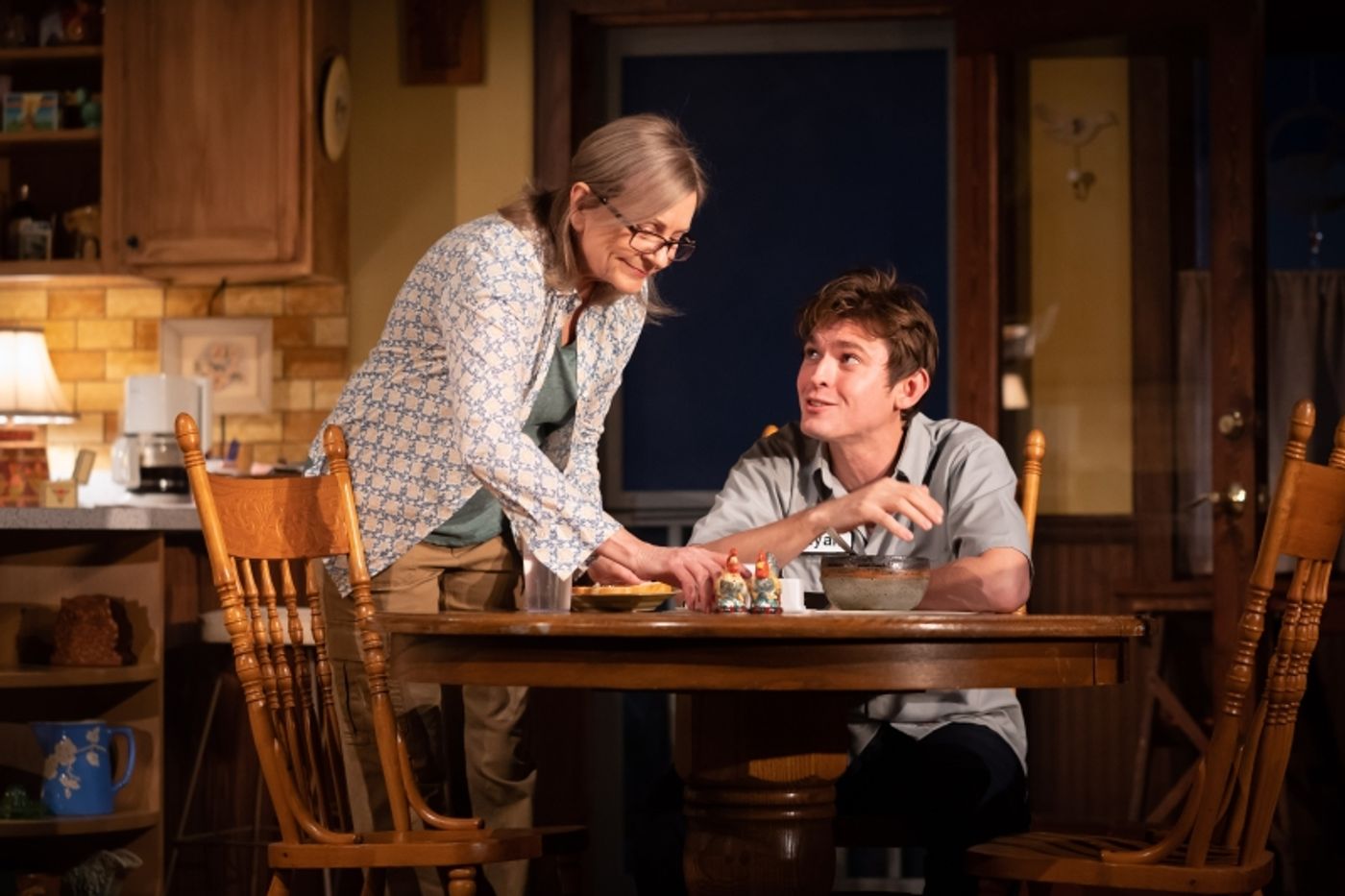Interview: Bubba Weiler on How SWING STATE is 'Taking the Temperature of America Right Now'
Learn more about the play's move from The Goodman Theatre in Chicago to Audible's Minetta Lane Theatre.

Audible Theater’s New York premiere of The Goodman Theatre production of Swing State, written by Pulitzer Prize finalist Rebecca Gilman and directed by Tony Award winner Robert Falls, is now in previews at Audible’s Minetta Lane Theatre. Swing State is also being recorded and released on Audible at a later date.
The original Chicago cast – Mary Beth Fisher (Peg), Kirsten Fitzgerald (Sheriff Kris), Anne E. Thompson (Dani) and Bubba Weiler (Ryan) – reprise their roles for the New York production.
Rebecca Gilman's Swing State is a contemporary portrait of the political and interpersonal state of our country in the midst of the global pandemic. The play follows Peg, a recently widowed woman in rural Wisconsin, who is visited by her young friend with a troubled past, Ryan. When Peg notices her husband’s toolbox is missing, she places a call to the local authorities, and sets off a chain of events that will forever change the community.
BroadwayWorld spoke with Bubba Weiler about the journey of "Swing State" from The Goodman Theatre in Chicago to its Off-Broadway run at Audible's Minetta Lane Theatre, how the cast members are reprising their roles and working together to deepen their understanding of the play, and more.
Read the full interview below!
The world premiere of Swing State opened at The Goodman Theatre in Chicago and has now moved Off-Broadway to Audible’s Minetta Lane Theatre. How does it feel to have the opportunity to bring this show to New York audiences?
It is incredibly exciting to me that we get to share this new play with New York audiences. I grew up in a suburb of Chicago, and I worked at the Goodman as a teenager and then moved to New York when I was 18, for college. So, this is sort of like a beautiful synthesis of my two communities. I grew up watching these incredible Chicago theater actors on stage, Mary Beth Fisher, Kirsten Fitzgerald, and the fact that I got to do a show with them in the first place is sort of mind blowing and exciting to me. But to then get to bring it to New York, and to show my friends, and my chosen family in New York, and the theater community in New York, is such a beautiful opportunity.

And the Chicago cast members are all reprising their roles for the New York production. How does that feel to continue to experience this show with them and continue to grow with the show alongside them?
They are all the loveliest, kindest, easiest people in the world, and they’re all so smart and curious about this play. It’s really cool to be back with this material, because we all care so deeply about it. We’re interrogating it from a whole new place, and just making the work deeper, and investigating the choices we made last time, making sure they still make sense. We're really trying to come at it from this fresh, new perspective, while also holding on to the things that we found before and that we know work.
What was it like going from the stage in Chicago and then getting back into the rehearsal room for the New York production, and having the opportunity to dig even deeper into your character and the work itself?
That’s exactly it, it’s an opportunity to go deeper. When you do a show, the time that you get to work on a play is so limited, right? So, you do all the work you can by the time you have to put it up in front of an audience, and then you open, and then you have a run, and you learn so much during the run. So, getting to do another rehearsal process after you’ve done the run and learned from the run is like you’re starting a race from a mile ahead already. And there is always more work to do, you can always go deeper and get closer and closer to your character, and invent more previous circumstances, and learn more about your character. We’re not taking it for granted that we’re finished on this piece at all, we’re saying, “Here’s the work that we’ve done, and there is more work to do.”
Can you share a little bit about the character that you play?
I play Ryan, who is a truck driver, who has been incarcerated, he’s been in prison for the last three years, released from prison right before Covid is starting. He has some alcohol abuse issues, and he’s really trying to make a life for himself, and to keep a steady job, and to rebuild after some mistakes that he’s made. He’s had a really rough life, he’s had a rough childhood, alcoholic parents, but he’s had this woman, Peg, who’s his neighbor, and her husband, Jim, who have really always, his entire childhood, taken him under their wing. And so, this story is partially about Peg trying to get Ryan back on a good path, and to make sure he’s okay, and safe, and taking care of himself.
.jpg?format=auto&width=1400)
And have you’ve discovered new things about the character?
Our director, Bob Falls, is a bit of a Stanislavski expert, he went to Russia, and he studied the Stanislavski method, and so he offered that to us as a tool to develop character. And part of that is knowing as many details about your characters life as you possibly can. So, wrote what happened to our character 24 hours before every scene. And then we wrote a big timeline of our entire life, from the time we were born to the time the play starts. So basically, what this rehearsal process allowed us the time to do, is to go even deeper, to get more detailed, to come up with more shared events between characters, just so that we all really feel that we’re living in the same world with the same past and history with the characters.
Doing this role with this cast, such a great text, and challenging character, and Bob has been such a beautiful guide for all of this, it’s been such an education. I had never worked with this method before, so I really felt like I was also in school a little bit. I feel so lucky.
What can audiences expect to see with Swing State?
Swing State at its heart is a play that is taking the temperature of America right now. It’s taking the time to say, ‘Hey, we all just went through something really big, and profound, in terms of Covid, and the political landscape these last three years, four years, five years.’ It’s saying, ‘Yeah, we are moving on from the pandemic as a culture, but we have to stop and make sure that we’re all okay.’ It’s about looking out for your neighbors, it’s about checking in on your friends. It’s a play that really sees you and says, ‘Hey, I know you’ve been going through this thing, we’ve all been going through this thing, and I think we should talk about it.’
What do you hope that audiences take away from this show?
I hope they take away that they’re not alone, we’ve all been going through it these last few years, and I hope that they feel recognized, and they feel that it’s okay if they’re in a place of grief. I do want to say that it sounds really heavy, this play, but Rebecca Gilman does such a good job of dosing it with such humanity, and heart, and humor that while I do hope that this play resonates on a really deep level, I also think that they will have a really exciting time at the theater when they come, because the storytelling from Rebecca is really strong, and suspenseful, and exciting.
In addition to doing this play at the Minetta Lane, we are also recording it for Audible, which I’m very excited about because I do think this is a play that should reach as many people as possible. And the Audible recording gives people a chance who maybe can’t get to New York or Chicago, or who live in New York and can’t get to the theatre, an opportunity to experience this play. So, we’re really excited about that aspect too.
Photo credit: Liz Lauren
Powered by
|
Videos

